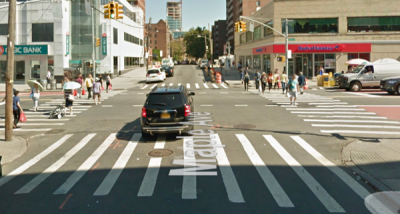Criminal Court Judge Upholds Constitutionality of Right of Way Law
A judge ruled against a motorist who filed a lawsuit challenging the constitutionality of the Right of Way Law.

MD Hossain, a yellow cab driver, was the first person charged after the law took effect in August 2014, when he drove a taxi into 58-year-old Silvia Gallo, killing her, while turning into a crosswalk at Madison Avenue and E. 79th Street.
According to a ruling by New York County Criminal Court Judge Ann E. Scherzer, Hossain claimed the law violates the state and U.S. constitutions by “undermin[ing] the very concept of innocent until proven guilty” and “purport[ing] to regulate alleged reckless driving ‘by imposing criminal penalties on a strict liability’ basis.” Hossain also challenged the law as it was applied in his case.
Hossain claimed the Right of Way Law does not require proof of driver negligence, or proof that a driver committed “any other traffic violations,” in order to be held liable for harming people, and therefore improperly shifts the burden of proof to motorists who are charged under the law.
Scherzer ruled that strict liability laws are authorized by the New York State code, and rejected Hossain’s assertion that the Right of Way Law presumes driver guilt.
In fact, to sustain a conviction for this charge the People would have to prove beyond a reasonable doubt that (1) defendant operated a motor vehicle, (2) that defendant’s motor vehicle caused contact with a pedestrian or cyclist, (3) that the pedestrian or cyclist had the right of way at the time of the impact … and (4) suffered physical injury as a result of the collision.
In addition to the elements listed above, the statute provides that physical injury that was not caused by a driver’s failure to exercise due care does not violate the statute.
“None of [the] defendant’s arguments come close” to demonstrating that the law is unconstitutional, Scherzer wrote.
Scherzer also threw out Hossain’s argument that the evidence in his case, which included video and Hossain’s own “admissions,” amounted to hearsay.
The decision showed that the court interpreted “due care” as an affirmative defense — evidence provided by the defendant that can negate liability — attorney Steve Vaccaro told Streetsblog. “This is important because the relevant information is usually in the hands of the driver, not the crash victim, who may be dead or have memory loss, and would be unable to prove a lack of due care affirmatively,” said Vaccaro.
“Before the Right of Way Law, only the officer’s observation of the crash — not videotapes of the crash — would support a charge, except in cases handled by the Collision Investigation Squad,” Vaccaro said. “Now, a non-CIS police officer can collect and watch video, record spoken admissions by the driver at the crash scene, and lay charges based on those types of plainly reliable evidence. This is exactly what the Right of Way Law was supposed to accomplish.”
In a separate case, the Transport Workers Union challenged the constitutionality of the Right of Way Law in federal court last year before reaching a settlement with City Hall and dropping its suit.
Hossain was charged with careless driving in addition to the Right of Way Law violation, according to court records. He is due back in court later this month.
(h/t @BrandonWC)


